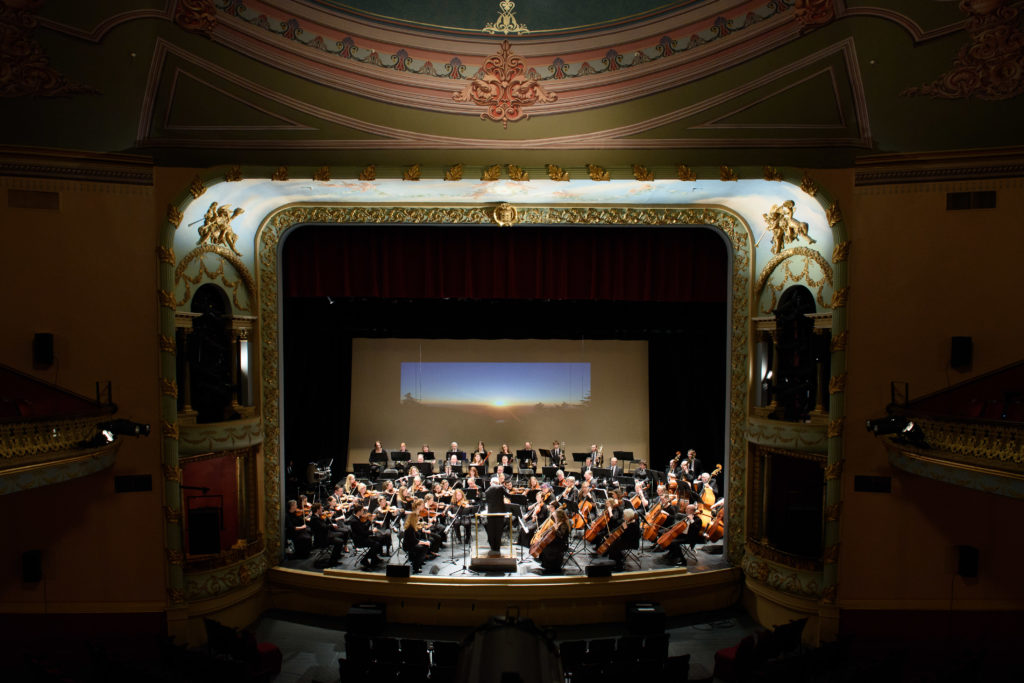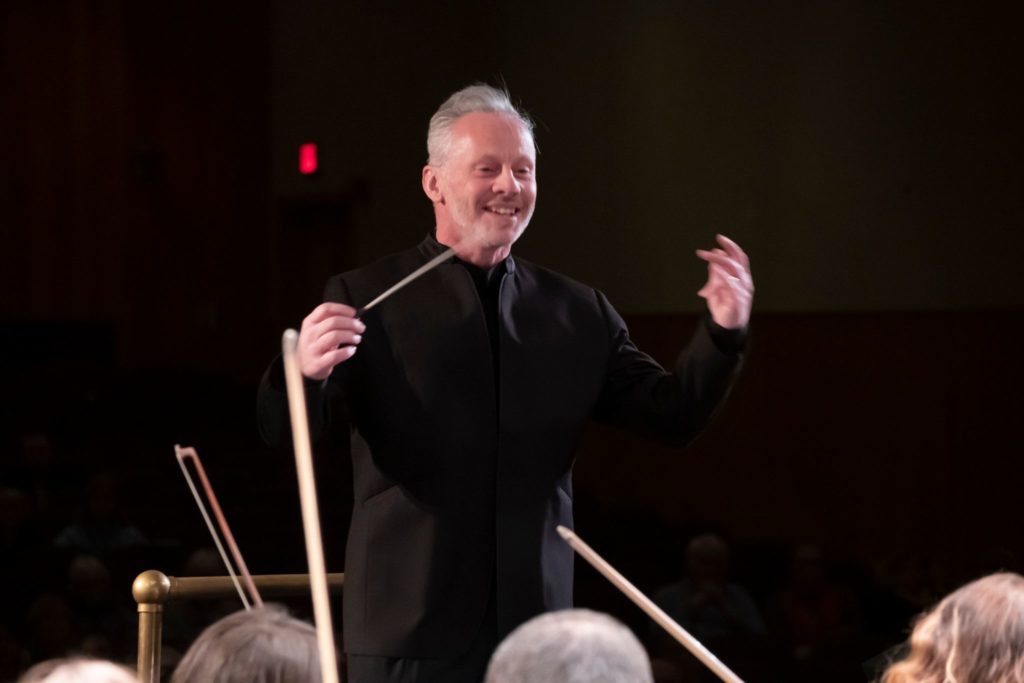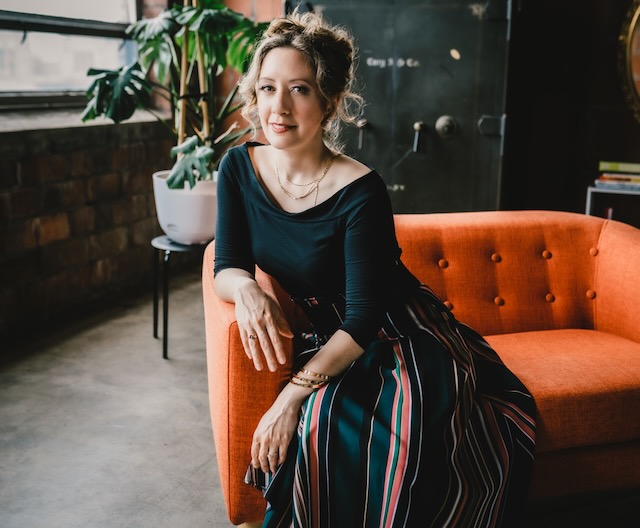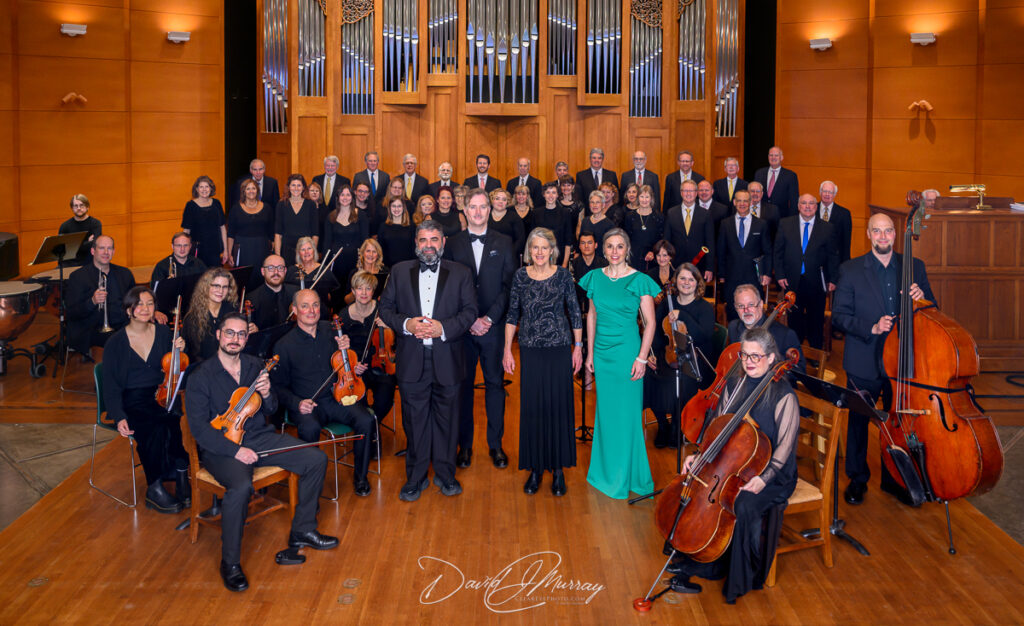Presenting Sponsor
Based in Greenland, New Hampshire, Auger Building Company has been building and remodeling high-end custom homes and boutique commercial since 1984. Renowned for artisanship and mastery of complex projects, Auger Building Company is an award-winning team with projects featured in several national trade publications, including Remodeling Magazine where Ben Auger was selected as one of the country’s top 50 remodeling contractors. For Ben and his crew, every construction project is an opportunity to excel creatively and deliver exceptional and lasting value.
Sponsors
Message from the President

The Portsmouth Symphony Orchestra heads into our 26th season grateful to be part of the vibrant Seacoast community that supports the arts and culture organizations that bring us together.
The PSO’s mission is to entertain, educate, and encourage the audiences of today and tomorrow. Each year, we have the opportunity to build on past successes and to explore new ways to connect people to great classical music. This year, we are particularly excited to perform the jointly commissioned commemorative work, At This Point, written by Gregory Brown in honor of Portsmouth’s 400th anniversary. This reflective piece delves into the full range of Portsmouth’s history. Like the city from which we draw our name, the PSO has evolved and grown over the years. As we embark on our next 25 years and beyond, it feels appropriate to begin on a retrospective note.
Each season, the PSO relies on the contributions and investment of generous corporate sponsors, committed individual donors, community partners, and of course you, the audiences who purchase tickets and attend our performances. We are thankful for your collective support.
The PSO is fortunate to have a dedicated board of directors, an inspirational Music Director in John Page, and an array of talented musicians that bring our programs to life.
If this is your first PSO concert, welcome! If you are an annual subscriber, thank you for your continued support. We’re happy to see you again.
On behalf of everyone at the PSO, we hope you enjoy the season that we have prepared for you.
David Young
President of the Board of Directors
Message from the Music Director

Anchored by the commissioned work, At This Point by Gregory Brown, which celebrates Portsmouth’s 400th anniversary, the PSO’s 2023-2024 season is about reflection, exploration, and evolution.
In November, we pair Brown’s new work with two pieces by composers from traditionally underrepresented groups. The March concert provides an international counterpoint by exploring different facets of French musical creativity. In June, we’ll perform Tchaikovsky’s beloved Symphony No. 5, a masterpiece the PSO has not performed in more than a decade. And of course, in between we’ll celebrate the holidays together at our just-for-fun Pops! performances.
In addition to our mainstage concerts, we hope you’ll join us at our Family Matinees chamber music series. These are a wonderful way to connect music lovers of all ages with the wide repertoire that chamber music offers.
From a new work to an old favorite, this season promises to embody what all anniversaries are meant to do—allow for acknowledgment and appreciation of all that has come before and to renew our commitment to all that lies ahead.
We’re looking forward to making music together and are so happy you are here to share it with us.

John Page
Music Director
Program Listing
Fanfare for the Uncommon Woman No. 1 | Joan Tower |
Symphony No. 1 in Ab Major “Afro-American”
| William Grant Still |
—Intermission— | |
World Premiere | Gregory W. Brown lyrics by Todd Hearon |
Artist Biographies
Gregory W. Brown, Composer

Composer Gregory W. Brown’s works have been performed across the United States and Europe — most notably in Weill Hall at Carnegie Hall in New York City, Cadogan Hall in London, and the Kleine Zaal of the Concertgebouw in Amsterdam. His commissions for vocal ensemble New York Polyphony have been heard on American Public Media’s Performance Today, BBC Radio, Minnesota Public Radio, Kansas Public Radio, and Danish National Radio; his Missa Charles Darwin received its European debut in March 2013 at the Dinosaur Hall of Berlin’s Museum für Naturkunde.
Brown’s 2015 CD of original choral and vocal works —Moonstrung Air — was Q2’s Album of the Week for Feb 16th: “[Brown’s] command of transcendent sound is constant” and Gapplegate Classical-Modern Review remarked: “The performances are exemplary, the sound excellent and the compositions show us that Gregory W. Brown takes to vocal writing as a natural. The music has eloquence, verve and old-in-new panache.” Missa Charles Darwin was recently re-issued in a special edition to coincide with the publication of his brother’s latest novel — Origin — in which it makes an appearance.
Brown’s cantata — un/bodying/s — was premiered by two-time Grammy-winning Philadelphia choir The Crossing in June 2017 and released on Innova Records in 2018. This 35-minute cantata for 24 voices uses new texts by poet Todd Hearon and focuses on issues of displacement and ecology around the creation of the Quabbin Reservoir. Gramophone’s review of un/bodying/s remarked that “[Brown’s] writing is lively and affecting, full of exhilarating lines amid pungent details.”
His latest major work — Fall & Decline — was commissioned by Variant 6 and released on Navona Records in 2021. Recent commissions include works for Variant 6, Grammy-nominated Skylark Ensemble, and the Malta Philharmonic Orchestra.
Todd Hearon, poet and lyricist

Todd Hearon is an award-winning poet and songwriter, born in Fort Worth, Texas, and raised in the Blue Ridge Mountains of North Carolina. The hymns and folk songs of his youth continue to influence his music, along with more edgy, contemporary Americana and Country-Rock sounds. He played bass and guitar for The Spin, one of the most successful alternative rock bands to come out of the Dallas Deep Ellum scene in the 1990s. After a career spanning six years and four albums, extensive touring and the cultivation of a broad fan base, he hung up his musical hat for graduate school in Boston, earning his Masters and PhD in English and Irish Studies, and co-founding The Bridge Theater Company, an independent troupe in Boston’s Theater District. He’s the author of three collections of poems, Strange Land, No Other Gods and Crows in Eden, several plays and a novella, DO GEESE SEE GOD.
He has received a PEN/New England ”Discovery” Award, the Friends of Literature Prize (Poetry magazine and the Poetry Foundation), the Rumi Poetry Prize (Arts & Letters) and the Campbell Corner Poetry Prize (Sarah Lawrence College). He was the Dobie Paisano Fellow/Writer-in-Residence at the University of Texas in Austin and served as the Dartmouth Poet-in-Residence at the Frost Place in Franconia, New Hampshire. His poems, essays and plays have appeared widely in literary journals in this country and abroad.
Music has never been far from his center, even as he extended his reaches into other art forms. Armed with a 1950 Gibson J-50 named Myrtle, and a host of new songs that hearken back to his roots in southern folkways and deep-flowing Americana streams, he’s back, ready to share his music with the world. Border Radio and Yodelady are his first two studio albums.
Jamie-Rose Guarrine, soprano

Soprano Jamie-Rose Guarrine is acclaimed for her “utterly thrilling, agile voice” and praised for bringing “pathos, beauty, and heartbreaking skill” to her performances. She has performed on the stages of Los Angeles Opera, Minnesota Opera, The Santa Fe Opera, Wolf Trap Opera, Opera Philadelphia, Chicago Opera Theater, Austin Opera, Utah Opera, Fort Worth Opera, and on the concert stage with the Madison Symphony, the Saint Paul Chamber Orchestra, the Santa Fe Chamber Music Festival, The National Symphony Orchestra of Costa Rica, and the Santa Fe Symphony, among many others.
An accomplished interpreter of Mozart opera, Guarrine has been seen at the Austin, Utah, Minnesota, and the Florentine Operas in her signature role of Susanna in Le nozze di Figaro, and “delivered a lovely Pamina, singing with warmth, depth, and relaxed power” in Mozart’s Die Zauberflöte (Milwaukee Journal Sentinel). Additional career highlights include Poppea in Handel’s Agrippina at Opera Omaha, the title role in Lucia di Lammermoor at Opera Saratoga, and a return to Minnesota Opera for Strauss’ Arabella, where she “traversed the Fiakermilli’s coloratura flights with ease and clarity” (Opera News).
Her diverse performance repertoire ranges from the masterworks of Bach, Handel, and Mozart, to modern works such as the roles of Xanthe/Aphrodite in Mark Adamo’s Lysistrata and Maria Celeste Philip Glass’ Galileo Galilei. In the fall of 2017 she created the role of “Fury” in Julian Wachner’s Rev.23 for performances in Boston at John Hancock Hall, New York at Trinity Wall Street, and National Sawdust in Brooklyn. Dr. Guarrine’s debut album, Transparent Boundaries: Songs Set to the Words of Dickinson, Whitman & Emerson, featuring newly commissioned works by Lori Laitman, Daron Hagen, and Scott Gendel, debuted in 2020 on the PARMA label and all streaming platforms, and was featured in numerous publications including Gramophone Magazine. She is frequently seen in concert, as a collaborator at chamber music festivals, and in recital, and proudly serves as Associate Professor of Voice at the University of Massachusetts Amherst.
Portsmouth Pro Musica

Portsmouth Pro Musica is dedicated to providing an enriching musical experience to both our members and audiences through the scholarship and presentation of diverse professional-level choral repertoire. The chorus is well-known throughout the Seacoast for the warmth and energy of its sound, adventurous programming and excellent musicianship. Concerts are presented with attention to detail, precision and accuracy of interpretation. PPM aims to share with its audiences the beauty and variety of choral literature. The chorus draws its voices from the greater Seacoast area, including New Hampshire, southern Maine, and northern Massachusetts. You will truly be enriched, as we are, by becoming part of this wonderful music community at our concerts.
Priscilla Stevens French, founding Artistic Director of Portsmouth Women’s Chorus for 21 seasons, led the transformation of PWC into a new mixed chorus, Portsmouth Pro Musica, in the spring of 2006. Priscilla earned a B.A. from Beloit College and received her Master’s degree in Choral Conducting from the New England Conservatory of Music studying under Lorna Cooke deVaron. She spent her junior year at Manchester College, Oxford, England, studying organ and musicology.
Prior to moving to New Hampshire in 1985, Priscilla was chairman of the Music Department at Spence School in New York City. While living in New York she studied conducting with Amy Kaiser. She has served as past president of the New Hampshire chapter of the American Choral Directors Association and Eastern Division chairman for women’s choirs.
Musicians
Violin I
- Zoia Bologovsky
Concertmaster - Nicole Wendl
Assoc. Concertmaster - Aniko Geladze
- Louise Kandle
- Rachel Swanson
- Lorna Ellis
- Kimberly Plummer
- Lisa Brooke
- Samuel Lyons
- Jill Good
- Paul Pinard
- Susan Holcomb
Violin II
- Ashley Offret*
- Susan Streiff**
- Sai-Ly Acosta
- Lauren Alter
- Jeff Sullivan
- Kristin Sullivan
- Becca Bannon
- Abigail Sykes
- Megan Fedor
- Nicholas So
- Evelyn Laux
Viola
- Theresa Jaques*
- Karen McConomy**
- Wendy Keyes
- Jan Heirtzler
- Eric Salas
- Dave Cabral
- Maggie Chutter
- Thalia Dain
- Craig Peverly
- Michele Boulanger
Cello
- Gary Hodges*
- Larry Veal**
- Eli Kaynor
- Melissa Ambrose
- Fay Rubin
- Lauren Wool
- John Acosta
- Zachary Larson
- Kurt Villiard
- Molly Goldstein
Double Bass
- Robert Hoffman*
- David Hirsch
- Nate Therrien
- Joe Annicchiarico
- Scott Kiefner
Flute
- Aubrie Dionne*
- Laurel Crawford
- Erin Dubois
Piccolo
- Erin Dubois
Oboe
- Sarah Krebs*
- Amanda Doiron
- Jill Hoffmann
English Horn
- Jill Hoffmann
Clarinet
- John Ferraro*
- Katrino Veno
- Santiago Baena Flórez
Bass Clarinet
- Santiago Baena Flórez
Bassoon
- Melissa Grady*
- Rick Shepard
Contrabassoon
- Rick Shepard
Horn
- Orlando Pandolfi*
- Susan Williams*
- Sophie Flood
- Gray Ferris
Trumpet
- Adam Gallant*
- Mark Zielinski
- David Shepherd
Trombone
- Brandon Newbould*
- Ben Sink
- Phil Hyman
Tuba
- Crystal Metric*
Timpani
- Steve Cirillo*
Percussion
- Timur Rubinshteyn*
- Mike Williams
- Alyssa Ostrowski
- Spencer Wiles
Banjo
- Dan Lorenz
Harp
- Sorana Scarlat
Celesta
- Seth Hurd
Perform with the PSO
The Portsmouth Symphony Orchestra seeks classical musicians in the community to audition for a place in the orchestra.
We invite all musicians, from professionals and educators to devoted amateurs and highly accomplished students to audition for a place in the orchestra.
Singers
Soprano
- Marie Collins
- Leslie Couse
- Brigette Dumont
- Stacy Krecklow
- Adelyn Nelson
- Evanna Rawlins
- Joanne Spradlin
Alto
- Cynthia Bear
- Jessica Bolker
- Merry Craig
- Molly Darling
- Diane Day
- Shelby Pouliot
- Nova Mullineaux
- Jeannie Sowers
- Sarah Tully
Tenor
- Paul Carleton
- Michael Gallipo
- Scott Joy
- John Martin
- Chris Turner
- Michael Weaver
Bass
- Chris Brown
- Fred Calcinari
- Art Greenberg
- Albert Lantinen
- Wesley Lovell
- Joseph Nossiff
- Brice Ovitt
- Mark Weaver
- Robin Wunderlich
Program Notes
Fanfare for the Uncommon Woman No. 1
Joan Tower
Over the course of almost six decades, American composer Joan Tower (b. 1938) has produced a compelling and uncompromisingly well-crafted body of work that includes compositions for orchestra, chamber ensembles, solo instruments, ballet, and symphonic bands. After the risky decision in the mid 1970s to abandon the restrictive bonds of serial music, Tower was guided by a more organic, intuitive approach, one in which each idea develops from the one that precedes it; simpler, less dissonant, and somewhat Impressionistic. Her unique musical voice is shaped in part by her childhood and adolescence in South America, an experience she credits for establishing her life-long affinity for the muscular, vital rhythms which characterize the majority of her compositions. Having crafted a career among mostly male colleagues in the post-WWII era, she has been hailed as a pioneering, empowering force for women composers.
“Fanfares for the Uncommon Woman,” of which there are six, were composed between 1987 and 2014, the last one coming 22 years after the penultimate “Fanfare.” Sometimes viewed as a sort of feminist counterpoint to Aaron Copland’s “Fanfare for the Common Man,” Tower’s “Fanfares” are inspired by and pay tribute to the elder composer [Marin Alsop] while making their own vibrant musical statements.
Identical in instrumentation to and containing musical quotes from Copland’s “Fanfare,” and written in 1986, “Fanfare for the Uncommon Woman No. 1” is for “women who take risks and are adventurous” (Joan Tower, liner notes to Schirmer edition). It was immediately embraced as a “historic feminist statement in music” (Tamara Bernstein, Liner notes to “Fanfares for the Uncommon Woman,” Koch International Classics, 3-7469-2, 1999). Dedicated to conductor Marin Alsop, the work features the full complement of brass (three trumpets, four French horns, three trombones, tuba) and percussion required by Copland with the addition of marimba, chimes, glockenspiel and drums. The dramatic percussion opening portends something significant; the work, at just under three minutes in duration, is heady, bold, and urgent. It was premiered by Hans Vonk and the Houston Symphony as part of their Fanfare Project in 1987.
The most popular of the six “Fanfares,” No.1 has received over 500 performances and has earned a secure position in the canon.
The “Fanfares” were added to the National Recording Registry in 2014, having met the Library of Congress’ criterion of being “culturally, historically, or aesthetically important.” They are among Joan Tower’s most recognizable works, having much in common with the bulk of the composer’s oeuvre: they are exhilarating, colorful, textural, dynamic, and vigorous, making clear and persuasive statements in a unique musical voice.
An excerpt from Ellen Grolman’s 2014 Essay “Fanfares for the Uncommon Woman”
Ellen Grolman is Professor Emerita at Frostburg State University in Frostburg, Maryland, where she taught for 30 years in the Department of Music. She is the author of “Emma Lou Diemer: A Bio-Bibliography”; “Joan Tower: The Complete Bio-Bibliography,” and the editor of a two-volume set of Maddalena Lombardini Sirmen string trios. In retirement, she produces and hosts a weekly, two-hour live radio show, “Music of our Mothers,” on WFCF 88.5 FM.
Symphony No. 1 in Ab Major "Afro-American"
William Grant Still
Still was a pioneer for African-Americans in “classical” music composition; he was the first American Black man in practically everything having to do with conducting and composing for symphony orchestras and opera companies. The scion of a distinguished family, he was a descendent of the famous 19th-century abolitionist, William Still. While more fortunate members of the family bought their freedom or escaped north, his immediate family was left behind in slavery in the southernmost isolated county in Mississippi (south of Natchez). He was born in Woodville, Mississippi in 1895 to a remarkable woman, who took him out of that agrarian obscurity to Little Rock, Arkansas, where she went on to teach high school for many decades. She and his stepfather gave him great encouragement and created an artistic home environment in what were obviously difficult times for folks with their aspirations. With encouragement and apparently great ambition, he learned the violin, cello, and oboe, and at an early age attended Wilberforce University in Ohio with the goal of becoming a composer—especially for the symphony and opera. Soon thereafter he enrolled in Oberlin College, and after military service in WWI, he accepted a position with W.C. Handy (composer of The Saint Louis Blues) in New York City.
His career there blossomed—while not achieving fame as a composer right away, he nevertheless worked at the highest levels of New York musical circles as an arranger. Radio and musical theatre became his métier, and a veritable Who’s Who of musical luminaries became his associates: Paul Whiteman, Artie Shaw, Sophie Tucker, Noble Sissle, Eubie Blake—the list is impressive and long. Along the way he studied musical composition, most notably with the important early twentieth-century composer, Edgar Varèse. Soon a flood of works ensued, and his music ultimately was performed by groups such as the Philadelphia Orchestra, the Berlin Philharmonic, and the BBC Orchestra, to just name a few. He left New York in the mid-1930s for Los Angeles, where he spent the rest of his life, and began another successful career arranging and composing for the film and television industry, but focusing on “serious” composition. From then on, a torrent of works ensued: operas, ballets, symphonic poems, orchestral suites, choral music, songs, and five symphonies.
His first symphony, subtitled “Afro-American,” was composed in 1930 and was the first symphony composed by a Black man and performed by a major American orchestra (in this case, the Rochester Philharmonic). Notwithstanding his study with Varèse, and the deep influence of the famously avant-garde composer upon on him, the symphony is a rather conservative work, cast in a tonal, accessible idiom. He indicated that his intent was to reflect untutored musical characteristics of Black “sons of the soil,” hence the blues and spiritual (but not jazz) elements that thoroughly inform the work. Each of the four movements is associated with excerpts from poems by the important Black poet, Paul Laurence Dunbar, cast in dialect. These inform the moods of each of the movements, and respectively are entitled, “Twell de Night Is Pas,” “ W’en I Gits Home,” “An Ante-Bellum Sermon,” and “Ode to Ethiopia.”
The first movement contains strong allusions to the well-known twelve-bar blues structure, while the second is infused with intimations of Black spirituals, reflecting the metaphor of “going home” for death as an escape from the realities of difficult times. The third movement is animated (as most third movements are in a symphony), and in this case admirably reflects a sermon about “An’ we’ll shout ouag halleluyahs, On dat mighty reck’nin’ day.” Finally, the last movement is a noble and dignified evocation of the text: “Be proud, my Race, in mind and soul . . .”
–Wm. E. Runyan
© 2021 William E. Runyan
At This Point
Gregory W. Brown, lyrics by Todd Hearon
How do you celebrate 400 years of habitation? Settlement? Civilization? Portsmouth has spent 2023 answering that question with parades, art exhibits, films, concerts, and every type of gathering you can imagine. Here, tonight, we use music and poetry to explore the streets and stories at this point in time, while also reaching back to what Portsmouth may have looked and felt like before it was Portsmouth, before it was the homelands of the Abenaki people, or before man walked on this earth, at these precise coordinates. The first European arrivals carried more musical instruments than bibles, so our gathering here tonight feels all the more appropriate.
At This Point is divided into a number of short sections, each giving voice and musical expression to a time or a place in Portsmouth’s history. The narrator introduces the settlers of 1623, and their strident oboes (fourteen of them in tow) co-ordinate us. A seeking musical figure leads us through the landscape. The choir enters and paints a scene of early life here along the rocky coastline, before the narrator returns, reaching into the future to picture a time yet to come, and asks us to consider how we will be viewed by future generations.
A bell tolls and the soprano soloist takes us back to a time before 1623. A time when the laws of man and nature are blurred, and the sounds of the water and land are more audible than they are today. The land, the river, and the sea are very much alive and in tune with a time that precedes our own.
Abruptly the choir transports us to a peculiar brand of mid-20th century optimism. The orchestra transforms itself into light-music accompaniment and the choir slides around with chromatic slickness. Strawbery Banke, with all of its present-day positives, comes out of a complicated moment in American history. In the 1950s and ’60s the panacea of “urban renewal” dealt actual harm to historic buildings and deeply rooted existing communities that were being displaced across the nation—all in the name of progress. The benefits and joys of Strawbery Banke today are evident, but the wounds of its creation must also be remembered—as the wounds of Portsmouth’s own early years (which Strawbery Banke commemorates and commodifies) must be remembered—“slaves in the field . . . the heathen slaughtered” and the coming Revolution.
The narrator returns in the voice of the thirteen unmarked graves discovered in 2003 on Chestnut Street—about 100 yards from where we now sit. It had been long known that an African Burying Ground existed in the area—which at the time of its use was quite distant from what we would call the small community’s center—but its precise location hadn’t been known until that point. This discovery prompted a moment of reckoning for the community, with the subsequent creation of a poignant monument and the reinterment of the coffins, now restored and re-honored.
The English spoken in 1623 was the language of Shakespeare, Milton, and King James I. It is still (mostly) intelligible to us across those years—although as historian Dennis Robinson has suggested, it would be next to impossible for us to comprehend the speech of Portsmouth’s first settlers through their thick dialects and wooden teeth. What happens when we go back farther into pre-history on these grounds? How do we communicate with our deep predecessors? And they with us? The section, “Point of Graves,” ponders these questions.
The last days of the Puddle Dock were perhaps not the finest in Portsmouth’s history, but certainly one of its most colorful! The area now known as Prescott Park was once home to a vibrant community of shops, homes, and brothels. This faux sea-chantey tells some of the stories that come out of this time and place, culminating with a reflection on what is lost when communities (even less “civilized” ones) give way to progress.
Finally we hear the sounds of a bustling Market Square at holiday time. The peal of the North Church bell is heard chiming away, defining and celebrating time—celebrating our time together, here and now. We now look to the future, to outer space (the next frontier?), and to new exploration as Portsmouth moves forward, defining—as always—its own idiosyncratic path.
400 years from tonight, who and where will our descendants be? Will they speak the same language? Sail the same waters? What will they make of us?
© Gregory W. Brown and Todd Hearon 2023
 This co-commission with The Music Hall is supported in part
This co-commission with The Music Hall is supported in part
by an Alfred Nash Patterson Grant from Choral Arts New England
and The Gateway Fund.
Up Next
Donors
- Donna Saunders & Michael Chubrich
- Josephine Lamprey (posthumously)
- Clinton F. Miller
- Jessica McKeon
- Fay Rubin
- David & Sarah Young
- Katherine Wells Wheeler
- Lawrence & Linda Connell
- Lodowick Crofoot
- Lorraine T. Keazer
- Michael Schwartz
& Sharyn Potter - Mrs. Roger M. Doering
- Robert & Cyndi Bear
- The Allayne & Douglas Wick Foundation
- Albert Lantinen
- Andrew Park
- Craig & Shirley Peverly
- Ellen G Saas
- Kate & David Murray
- Lucinda Spaney
- M. Chris Dwyer & Mike Hustable
- Margot Doering
- QHT Inc.
- Renaissance Charitable Foundation
- Sherrill Nixon
- Steve Cirillo
- Anonymous
- Barbara & Robert Schultz
- Barbara Sweet
- Bruce Valley
- Catherine Anderson
- Charles Doleac
- David Tong
- Diana Bourns
- Fred & Barbara Engelbach
- Jameson & Priscilla French
- Jeff & Barbara Diefendorf
- Judith Howard & David Meikle
- Kathleen Tutone
- Rachel & Nate Swanson
- Thomas Harford
- Andrew & Pamela Kulesza
- Ann H. Tarlton
- Anonymous
- Anthony Codding
- Aubrie Dionne
- Bess4sahara
- Black Birch
- Brian Fitzgerald
- Bruce & Lori Myers
- Carol Miller
- Caroline & Nathaneal Piper
- Carolyn Vinica
- Chris & Mimi Brett
- Cynthia & Michael Harvell
- David & Eleonore Sanderson
- David & Marion Ellis
- David A. Taylor
- Don & Mary Jo Briselden
- Edward & Janet Caylor
- Elaine & Steven Molleur
- Elissa Margolin
- Emma Rous
- Evelyn Laux
- Frances Bechtold
- Frank Manter
- Fred Siegfried
- Gail Drobnyk
- Gilbert Loughlin Family
- Glenda & Ed Fischer
- Gregory E. Griffith
- Helen Gettelman
- Ingrid Susan Ahlberg
- Jacqueline Palmatier
- James Rosenfield
- Jan & David Heirtzler
- Janet Bilodeau
- Jeanne & Derek Stern
- Jo Ann B. Price
- Jo Ellen Thomas
- John & Eimer Page
- Kathryn Ellis
- Keith Lauder
- Kenneth Clark
- Kenneth Fuld
- La Belle Chocolat
- Lynn & John Pincomb
- Lynn DiElsi
- Mara Witzling & Peter Cass
- Mark & Mary Ann Janos
- Marvin Fry
- Mary Lou McElwain
- Melissa Ambrose
- Michael Thiel
- Nancy Zadravec
- Paul & Linda Hamlen
- Peter Bowman
- Philip Coco
- Philip R. Hepburn
- Richard Mechaber
- Roy William Helsel
- Seth A. Hurd
- Stuart & Gisela Wemple
- Susan Moniz
- The Family of Lauren Wool
- Virginia Macdonald
- Wayne Shirley
Board of Directors
- David Young, President
- Kate Murray, Vice President
- Jeffrey Gilbert, Treasurer
- Fay Rubin, Secretary
- Lawrence Connell
- Beverly Giblin
- Melissa Grady
- Jan Heirtzler
- Paul Lanzoni
- David Murray
- Craig Peverly
- Eric Salas
- Donna Saunders
- Rachel Swanson
Staff & Volunteers
- Caroline Amport Piper, Director of Communications
- Aubrie Dionne, Director of Outreach
- Erin Dubois, Operations Manager
- Jan Heirtzler, Librarian
- Craig Peverly, Equipment Manager
- Adam Gallant, Musician’s Coordinator
- Rachel Swanson, Graphic Design

 This co-commission with The Music Hall is supported in part
This co-commission with The Music Hall is supported in part 




